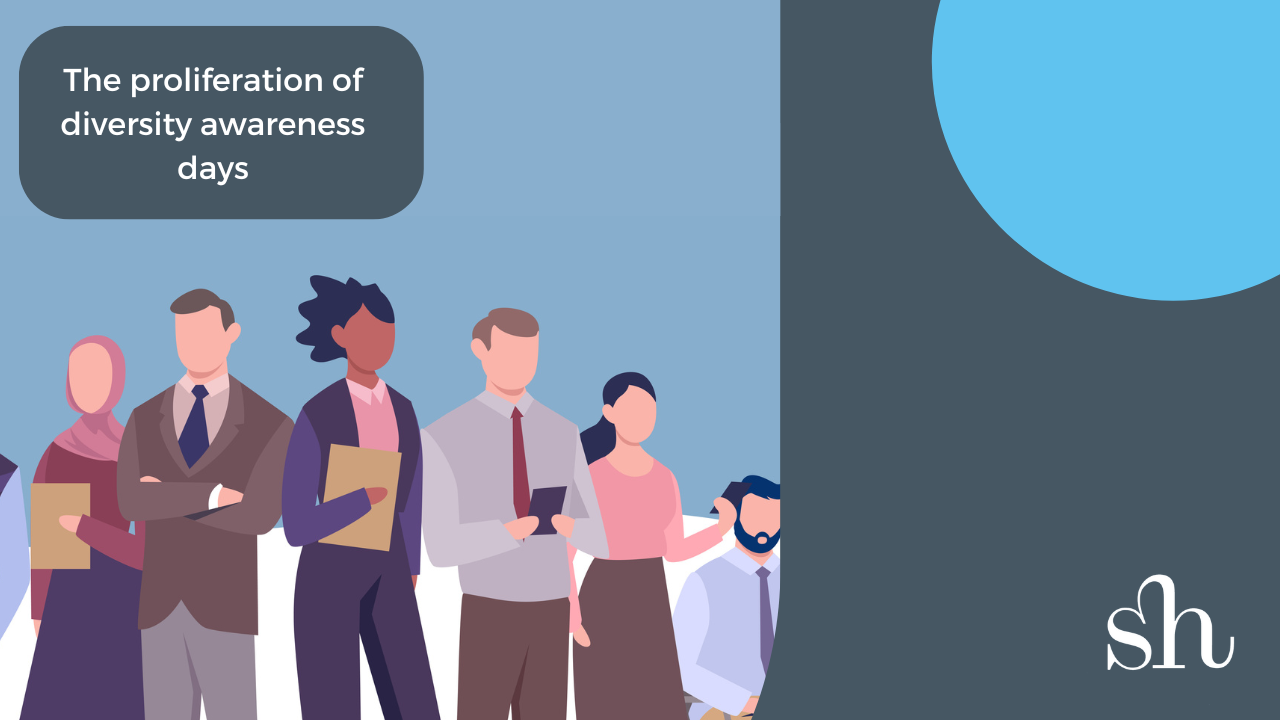

March:
A month of diversity celebrations
I don’t know about you, but I
feel as though every week there is a diversity awareness event or celebration
of some kind. March alone holds ‘International Women’s Day’, ‘Zero Discrimination
Day’, ‘National Wheelchair User Day’, ‘Endometriosis Action Month’, ‘Bisexual Health
Awareness Month’, ‘Brain Tumour Awareness Month’, ‘Women’s History Month’, ‘Sign
Language Week’, ‘Neurodiversity Celebration Week’, ‘Eating Disorder Awareness Week’,
‘World Down Syndrome Day’ and ‘Single Parent Day’! This does not even include
the religious holidays observed this month such as Ramadan and Easter.
For businesses, it can be challenging to maintain the
delicate balance between acknowledging all these different awareness days and doing so with a genuine underlying purpose. To me, it
frankly feels impossible to do all these days proper justice.
Balancing inclusivity and purpose
Diversity awareness events are
there to celebrate uniqueness, but beyond that, they
aim to create a more just and equitable society. As a business,
attempting to celebrate and at the same time achieve lasting change and
progress on all these different topics can feel daunting. While you do not want
to exclude any awareness events, you also want to ensure you’re acknowledging them in a genuine way, not just as an empty gesture.
There's a risk of merely
skimming the surface, missing the essence of why we celebrate diversity in the
first place. I believe we have, in some cases, lost sight of the true purpose
behind embracing difference, somewhere along the way.
In the United States, we are witnessing a concerning 'crisis of diversity &
inclusion,' marked by counter-movements actively undoing hard-won strides toward
workplace equality. This trend underscores the danger of losing sight of our
fundamental objectives, potentially causing any movement to go backward.
So, what steps can leaders
take to navigate this complex terrain? How can we acknowledge all these
different diversity events with purpose?
Empowering
employees as agents of change
I think it's important to
acknowledge the limitations of individual or organisational capacity to address
every facet of diversity and inclusion – it is just impractical to attempt to
effect genuine and purposeful change across every cause!
Instead, directing attention
towards a specific cause, one that resonates personally with you as an
individual or with your team or company as a whole holds greater potential for
meaningful impact. By understanding and embracing what matters to your employees,
and fostering a genuine commitment to that cause, you can actively contribute
to tangible progress rather than engaging in superficial gestures.
A
personal reflection on International Women’s Day
Contemplating the significance
of International Women’s Day has led me to consider its evolution over the
years. As we approach the 113th iteration on March 8th, I'm struck by the
journey it has undertaken since its inception, which predates women's suffrage
in the United Kingdom by over 15 years.
Originally established to
champion women's rights, International Women’s Day has grown into a platform
for addressing multifaceted aspects of women’s empowerment and the ongoing
struggle for gender equality. Its impact extends beyond mere observance, often spurring
legislative and policy changes aimed at advancing women's rights and combatting
gender-based discrimination and violence. Moreover, it fosters initiatives to
enhance women's participation across various spheres, including politics,
education, and the workforce.
Personally, I find immense
value in maintaining focus on International Women’s Day. It serves as a
poignant reminder for me to reflect on my own feminist beliefs and deepen my
understanding through continuous education. Lately, I’ve been interested in the
challenges women face after returning to work from maternity leave, having
returned myself in September after having a baby girl in 2023.
Consider this: while a
staggering 93% of mothers express a desire to return to work after childbirth,
only 13% deem full-time employment feasible. Even among those who do return
full-time, a disheartening 79% ultimately leave their positions within two years
– imagine all the talent we’re losing because of this! While we like to believe
women nowadays have a choice, the harsh reality paints a different picture.
This stark disparity
underscores the crucial importance of awareness days like International Women’s
Day. They provide a vital opportunity for collective reflection on the lived
experiences of underrepresented groups and highlight the persisting disparities
in opportunities.
Every awareness day emerges from the genuine struggles and narratives of diverse individuals throughout society. Hence, the next time we encounter someone sharing their perspective on a particular issue, let us pause to inquire about their story. Understanding is the cornerstone of empathy - the first step towards meaningful change.
Retaining women after maternity leave
And if we truly want to retain
women and all their talent after maternity leave, here are some quick tips to
consider:
· Offer
flexible working arrangements to accommodate their needs.
· For
larger companies with the budget, consider providing on-site daycare facilities
or offering a childcare benefit.
· Enhance
not only maternity pay but also paternity pay to promote equal responsibility.
· Avoid
discounting women for promotions or other career development opportunities,
both during their absence and upon their return.
· Have a
clear development plan in place to support their career progression.
· Offer enough 'Keep in Touch' (KIT) days to facilitate empathetic and open conversations about potential needs upon their return.
Latest opportunities
10% Car Allowance, 20% bonus
Manchester, Greater Manchester
Similar blogs





